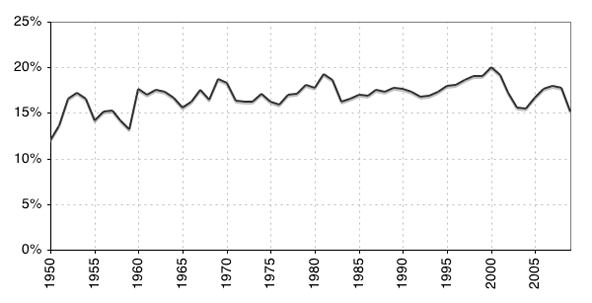AdamT
DP Veteran
- Joined
- Jul 26, 2011
- Messages
- 17,773
- Reaction score
- 5,746
- Gender
- Male
- Political Leaning
- Undisclosed
yes. just as there is an even huger difference in dollar terms between the average 20% of GDP that Bush spent, and the average 24.5% of GDP that Obama is spending.
indeed. so, now that we have agreed we prefer to collect in revenue closer to the 20% side than the 17% side... under which tax conditions do we historically see revenues coming in at closer to the 20% side? when marginal rates were higher? or lower?
(i'll give you a hint - 1983 is sort of a big year).
however, even that isn't as critical as it seems - because what the graph indicates is that revenues are not a direct function of tax rates. rates can fluctuate wildly without producing a comparable fluctuation in revenues - indicating that they are not controlling. but revenue does seem to generally be a direct function of GDP. If you want more revenue, therefore, you need economic growth. which you won't get by dramatically hiking marginal tax rates.
Again, you really can't tell much from that graph because of the scale used for the tax line. Here's a better view:

So in fact revenue as a percentage of GDP plunged in '83 as a result of the Reagan tax cuts. Then it gradually rose in the 90s as a result of the Clinton tax hikes, and it plunged again in the 00s due to Bush's tax cuts. Obviously other factors also play a part. There has to be a balance in tax rates keep the economy strong while maximizing revenue (Laffer curve). Presently, taxation is at a low not seen since the 1950s. It is too low.
